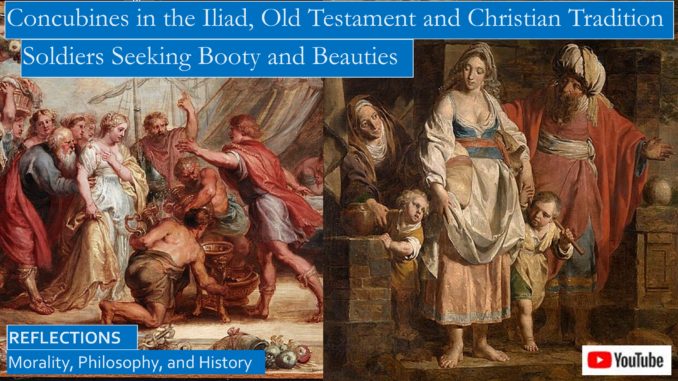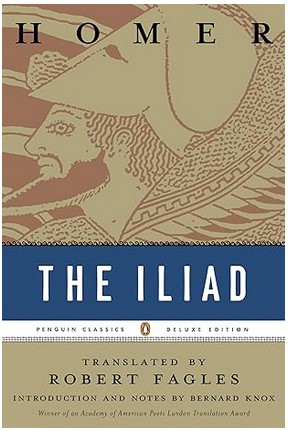
The Iliad is about the rage of Achilles, the first verses of the Iliad celebrate the rage of the great warrior Achilles, the very first word of the Iliad is:
“RAGE – Goddess, sing the rage of Peleus’ son Achilles,
murderous, doomed, that cost the Achaeans countless losses,
hurling down to the House of the Death so many sturdy souls,
great fighters’ souls, but made their bodies carrion,
feasts for the dogs and birds,
and the will of Zeus was moving toward its end.
Begin, Muse, when the two first broke and clashed,
Agamemnon Lord of men and brilliant Achilles.”[1]
REFLECTIONS ON THE ILIAD
Iliad Blog 1: Iliad, Blog 1, Why Should a Christian Read the Iliad?
http://www.seekingvirtueandwisdom.com/iliad_blog01/
The Iliad, the Basis of Greek Culture and the Western Philosophical Tradition
https://youtu.be/DpmuhZJUJn0
The Iliad, blog 4, Briseis, Chryseis, Aren’t all Concubines the Same?
http://www.seekingvirtueandwisdom.com/the-iliad-blog-4-briseis-chryseis-arent-all-concubines-the-same/
YouTube video for Blogs 2 and 4: Concubines in the Iliad, Old Testament, and Christian Tradition
https://youtu.be/bGHHD7XTvr0
YouTube script for these two blogs, with more book links:
https://www.slideshare.net/BruceStrom1/concubines-in-the-iliad-old-testament-and-christian-tradition
Iliad, Blog 3, The Warrior Cultures of the Iliad and the American Indian, Bravely Visiting the Enemy Camp
http://www.seekingvirtueandwisdom.com/iliad-blog-3-visiting-the-enemy-camp-greeks-vs-indians/
https://youtu.be/ynIx-AVI2f8
The Iliad Blog 5, the Tide of Battle Turns Against the Greeks
http://www.seekingvirtueandwisdom.com/the-iliad-blog-5-the-tide-of-battle-turns-against-the-greeks/
The Iliad Blog 6, Embassy to Achilles, Oration, Failed Meeting
http://www.seekingvirtueandwisdom.com/the-iliad-blog-6-embassy-to-achilles-oration-failed-meeting/
The Iliad Blog 7, the deaths of Patroclus and Hector
http://www.seekingvirtueandwisdom.com/the-iliad-blog-7-the-deaths-of-patroclus-and-hector/
This video approximately corresponds to blogs 5 through 7, with some additional material:
The Iliad of Homer: Glory, Honor, Madness, and Futility of War: https://youtu.be/7lI2ZQ50wRc
CONTINUING WITH THE ILIAD
The RAGE that made Achilles the most dreaded warrior of the Greeks, the rage that drove him to slay so many noble Trojan warriors, was also the rage which urged him to withdraw from battle, the rage he felt when the main King Agamemnon seized the beloved maiden Briseis from Achilles, Briseis, the Trojan maiden, the prize of war.
The Iliad then backtracks to explain the plot-line behind this unfolding of the rage of Achilles. Before attacking Troy, the Greeks first attacked and sacked the cities of their allies surrounding Troy, and carried off many of their young maidens as newfound concubines, King Agamemnon won the young girl Chryseis, while King Achilles won the beauty Briseis.
This sound to our ears so brutal, that these men would without a twinge of conscience kidnap young girls in the heat of battle, but yet when we let the poetry of the Iliad sink in we realize that Achilles does truly love Briseis, and when she is taken away he loses his heart for battle. Likewise, Agamemnon professes fondness for Chryseis, with as much fondness as the Iliad permits him, more fondness then for his wife, especially since his wife is home in Greece many fathoms and many years away.
There is an interesting Mitzvah in Deuteronomy regarding captive women that the Iliad illuminates:
“When you go forth to war against your enemies, and the Lord your God gives them into your hands, and you take them captive, and see among the captives a beautiful woman, and you have desire for her and would take her for yourself as wife, then you shall bring her home to your house, and she shall shave her head and pare her nails. And she shall put off her captive’s garb, and shall remain in your house and bewail her father and her mother a full month; after that you may go in to her, and be her husband, and she shall be your wife. Then, if you have no delight in her, you shall let her go where she will; but you shall not sell her for money, you shall not treat her as a slave, since you have humiliated her.”[2]
The rabbis consider these verses important, for Maimonides draws out both the positive Mitzvah 221 and the negative Mitzvot 263 and 264 from them. The gist of the rabbinical commentary is that the captive beautiful woman should be treated with respect and dignity, she should not be treated as a mere slave, she should rather be treated as a wife like any other Jewish wife. She is to be left alone and not violated, allowed to mourn her loss for a solid month, clipping her nails, cutting her hair, to give time for the soldier’s lust to subside. Maimonides regards this verse as “only a concession to human weakness,”[3] and that “there is no doubt that one of the basest things a man can do is to discard a woman with whom he has lived together,”[4] particularly when alone she has no good way to earn a living for her and her children.
There is another verse in the Bible about a Jewish maiden captured by the Syrians, who was also treated with dignity, who was never violated, and truly became part of their family:
“Naaman, commander of the army of the king of Syria, was a great man with his master and in high favor, because by him the Lord had given victory to Syria. He was a mighty man of valor, but he was a leper. Now the Syrians on one of their raids had carried off a little maid from the land of Israel, and she waited on Naaman’s wife. She said to her mistress, “Would that my lord were with the prophet who is in Samaria! He would cure him of his leprosy.”[5] The prophet was Elisha, and he did cure Naaman of his leprosy.
We get a sense from these Old Testament verses and from the Iliad that it was common for soldiers in the ancient world to capture women as booty during war, and that the women usually accepted their fate, and generally the more civilized armies (Assyrians and Mongols excluded) treated these women with dignity and respect, that quite possibly these verses in Deuteronomy were not so unique to Israel as many modern commentators suppose. This helps to explain a comment by Agamemnon, when later in the Iliad he returns Briseis to Achilles, he says he has not violated her, which probably meant he respected her refusal of his advances, for she did not give up hope for the embraces of Achilles, the audience must suppose.
Interestingly, the Church Father Origen in his comments on these verses likens the beautiful captive woman to the truths of pagan philosophy, “when we read anything said (by the Greek philosophers) that is wise and knowledgeable, we must cleanse it, removing all that is dead and worthless. This is like when you trim the hair and clip the nails of the woman taken from the spoils of the enemy (the pagan philosophers), only then would you take her as a wife.”[6]
Iliad Blog 3 http://www.seekingvirtueandwisdom.com/iliad-blog-3-visiting-the-enemy-camp-greeks-vs-indians/
[1] Homer, “The Iliad,” translated by Robert Fagles (New York: Penguin Books, 1990), Book 1, 77.
[2] https://www.biblegateway.com/passage/?search=deuteronomy+21%3A10-14&version=RSVCE
[3] Rambam, aka Maimonides, “Volume 1 – The Positive Commandments,” translated by Rabbi C Chavel (Brooklyn: The Soncino Press, 1967), Mitzvah 221, p. 235. (not available on Amazon)
[4] Rambam, aka Maimonides, “Volume 2 – The Negative Commandments,” translated by Rabbi C Chavel (Brooklyn: The Soncino Press, 1967), Mitzvot 263 – 264, p. 249-250.
[5] https://www.biblegateway.com/passage/?search=2+kings+5%3A1-3&version=RSVCE
[6] Origen, “Homilies on Leviticus,” In Ancient Christian Commentary on Scripture, Old Testament, Deuteronomy, Volume III (Downers Grove, Illinois: Intervarsity Press, 2001), 309.









17 Trackbacks / Pingbacks